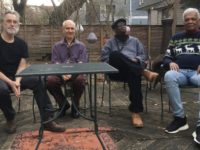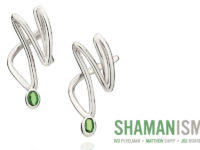They say that writing about music is like dancing about architecture, and if that’s true, then writing about whack jazz can be more like swimming about psychiatry. Often, you can’t describe a melodic or rhythmic structure because there are none. Saying so-and-so sounds like some other so-and-so is sometimes futile; most of the time these guys get lumped into “avant garde” or “experimental” precisely because they sound like no one else. And yet at the end of the day, I manage to string together some metaphors that somehow paint a portrait of the music that might be a smidge Picasso-abstract, but then again, often so is the music itself.
I say these things up front to warn you that even in that context, Steve Raegele’s Last Century is obstinately on its own island, making it a real bear to adequately describe. I might have to invent some new adjectives. But first, the straightforward part:
Montreal-based, Ottawa-born guitarist Steve Raegele has studied under Kurt Rosenwinkel, Dave Douglas, Joe Lovano, Wayne Krantz, Tony Malaby, and several others. He’s appeared on records by Thom Gossage’s Other Voices, the Isaiah Ceccarelli Ensemble and The Besnard Lakes, another other outfits. I can’t say I’ve heard of these names previously, but the Gossage tracks I just sampled make me want to hear more from him. It’s a little avant garde, too, but nothing compared to what Raegele is puttin’ down.
Which brings us back to this record, Last Century. Issued on February 9, this appears to be Raegele’s first album and right off he sets to make his own mark. Playing eleven all-originals (four of them really brief fragments), Raegele brings Gossasge in for drums, while Miles Perkins supplies acoustic bass.
Raegele, it must be noted, has drawn comparisons to Krantz, and he does run in the same sonic playground as Wayne (as he does with the late Sonny Sharrock), but his closest reference point to my ears is Marc Ribot, because he distills so many influences into an abstract approach that seems completely unconcerned about how many or few notes are stuffed into chords.
Raegele will play a crooked path of timbres, before lurching into an ostinato. He’ll stumble upon an pattern of some other idea and dwell on it for a short while, and then go back to random expression (“Stop Short”). Raegele also plays hopscotch back and forth between the line dividing tonal and atonal, so just as I’m about to say “a-ha, Joe Morris!” he slips in something melodic that Morris would probably never do (“Janet Jackson”). He’ll play almost ambient one minute and abrasive and even rock-ish the next (“The Opposite”). Raegele often doesn’t spin songs at all, at least not how one is accustomed to thinking about songs. Instead he’ll take minimal ideas and mold shapes and textures out of them (“Verdun”). Sometimes, his tactic is little more than to create bleak, exotic, sonic contours (“Last Century”, “Triangle – Daedalus”). Other times, he brings together these many facets of himself, as he does for “Fight Club The Rabbit,” which is also a showcase for the talented Gossage (that controlled commotion he makes behind the leader in the first three minutes is pretty sublime stick work).
Yeah. Just try to pin Steve Raegele down, he is one elusive devil.
The best cut for my money is the forty-two second “Triangle – Sisyphus” where he chases notes up and down a couple of flights of stairs with Perkin and Gossage fast behind. It might be a composed piece, but it strains to keep composure. Spurts of brilliant creativity like that keeps me wanting more instead of waiting for the next track to begin, not that Raegele ever held onto any idea long enough to test the listener’s patience.
Maybe it’s just me, but the adamant refusal of Last Century to be pigeonholed is the thing that makes it endearing most of all. It won’t come to you, you have to come over to it. Call that snobbery if you will, but some things are worth getting up and walking over to. This is one of those things.
Last Century comes to us courtesy of Songlines Records out of Vancouver, BC.
- Dave Douglas, feat. James Brandon Lewis – ‘Gifts’ (2024) - April 11, 2024
- Thollem – ‘Worlds In A Life, Two’ (2024) - April 8, 2024
- Oceans And [Tim Berne, Hank Roberts + Aurora Nealand] – ‘Lucid/Still’ (2024) - April 3, 2024





